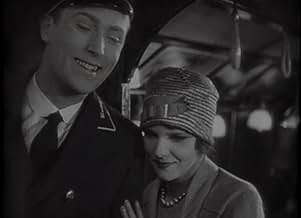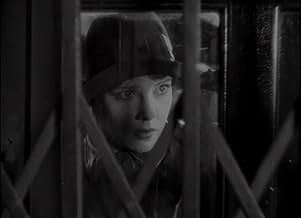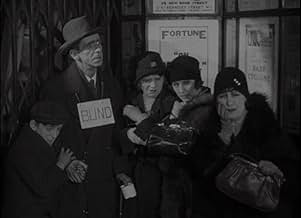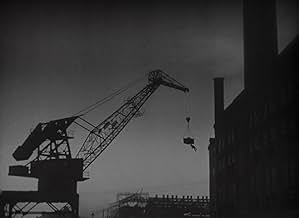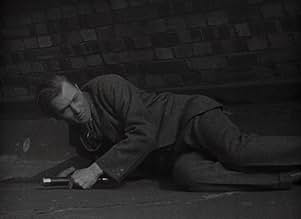A working-class love story set in and around the London Underground of the 1920s. Two men, gentle Bill and brash Bert, meet and are attracted to the same woman on the same day at the same Un... Read allA working-class love story set in and around the London Underground of the 1920s. Two men, gentle Bill and brash Bert, meet and are attracted to the same woman on the same day at the same Underground station. But the lady chooses Bill, and Bert isn't the type to take rejection li... Read allA working-class love story set in and around the London Underground of the 1920s. Two men, gentle Bill and brash Bert, meet and are attracted to the same woman on the same day at the same Underground station. But the lady chooses Bill, and Bert isn't the type to take rejection lightly.
- Director
- Writer
- All cast & crew
- Production, box office & more at IMDbPro
Featured reviews
"Underground" is delightfully well made, and very effective – funny without trying too hard in its lighter moments, thrilling and tense in its later scenes, which include a sophisticated chase/fight/stunt sequence. If there's a flaw, it's that this story of two lovers ripped away from each other by a conniving, jealous suitor and the besotted young woman who will do whatever the bad guy asks, is far to reliant on corny coincidences and obvious plot turns to quite escalate to great movie status for me. But it's still highly enjoyable and effective.
I wasn't crazy about either of the two score choices on this visually excellent Master's of Cinema recent blu-ray restoration. One 'score' is really a bed of mostly naturalistic sound effects for each location and situation, which was interesting, but didn't add much emotionally. The other - the 'main score' - went too far the other way. The orchestral score felt a bit too florid, dramatic and insistent, often overstating the emotions of a moment, and occasionally becoming distracting. Asquith did a great job of getting some psychological complexity into his silent characters, and having music that can sometimes swamp that subtlety isn't a help. The score also felt annoyingly 'modern' to my ears, in that it often sounded like nothing so much as the score to a Hollywood melodrama from the 1950s or 60s. That too felt distracting at times, as the image and music seemed forced together from different eras.
But those were minor complaints. Overall I was wonderfully surprised – now for the second time – at just how strong Asquith's silent films were.
Bill is impossibly clear-eyed and the shining light, Nell is similarly bright and cheerful, but Bert is much more mixed-up, with a mild malevolence that rebounds on him badly, and Kate has some wonderfully dramatic madness late on. The various set pieces are done well and progress things in am undemanding manner.
The new score by Neil Brand and recorded by the BBC Symphony Orchestra is heavenly, it suits the action on the screen to an absolute tee. I really can't think of much I didn't enjoy, the energy of the last denouement of the love dispute is thrilling, and there's a lot of gentle laughter to be hand beforehand.
The fact that the film closed to a round of applause from the audience says a great deal to me. A little peep of a bygone age, when men gave their seat up for women on public transport (when the woman in question actually wanted to sit down of course). Go see and prepare to fill your eyes with a cinematic feast.
Where's the fly in the ointment? Cyril McLaglen plays a pool playing, beer drinking scoundrel who hits on Elissa on the train. She's not interested, but he's just as convinced she's his true love as she is about Brian. So begins a riveting love triangle with more twists and turns than you'll be prepared for. Anthony Asquith's direction is extremely surprising, and if you didn't know any better, you'd think the movie was made twenty or thirty years later as a tribute to silent pictures. Most silent film directors stick to static shots, brightly lit close ups with only the star in the frame, and simple compositions. Asquith fills up his frame with extras who are all moving and conducting their own business, even during the leads' close ups. He's clearly ahead of his time, and it's a pleasure to watch his films. It's also great fun to watch Brian Aherne before audiences knew he had a lovely speaking voice! As a bonus, you'll hear a beautiful music score written for the remastered version-hats off to Neil Brand.
This is the first time that the BFI have done a Gala for a film restoration at the film festival, and I think they were quite pleased with themselves, and so they should be. This follows on from their recent revival of Anthony Asquith's great movie The Cottage on Dartmoor which has found it's way into the hearts of quite a few British film lovers. Before this, to even many film buffs, British silent cinema meant nothing except maybe they know of Alfred Hitchcock's The Lodger. Well British quality cinema did not start with Powell & Pressburger folks!
Approximately 80% of British silent output is destroyed as it was a fairly normal practise back in the days to recycle film stock for the silver content after the theatrical run had gone quiet. One of the great British film archives was liquidated for silver content after the owner went bankrupt. Apparently the celluloid content was taken to line aircraft wings!
To the movie, which concerns a love story that takes place for a large part on the then new phenomenon of the London underground. The movie takes some pleasure in exploiting the comedy value that arises from folks of all different social classes and walks of life sharing carriages in close proximity. Things have changed as I think it's really rather unlikely that you will run into a toff on the London underground. But perhaps they enjoyed the thrill of the novel back then.
Underground is mostly a love story, concerning two men vying for the same woman, Nell, whom they both meet on the Underground. Bert is a bit of a caddish upstart (if pushed a nasty upstart) who grinningly thinks to himself he's God's gift to women, which, however handsome he is, he is not, whilst Bill is a porter on the underground who is rather more genteel and respectful. In the real world it's probably a nice guy comes last situation, but on the silver screen it's pretty clear it's going to be Bill's who is favoured, right from frame one. That's not going to spoil the pathos though, really right the way through there's a significant amount of emotional sustenance. We want to know what Bert is going to have to say about it! The scene that worked the best for me was in the park where Bill and Nell have a picnic. It can be described with no other word than magical, it makes the heart swell with gladness. There's a combination of warmth, humour and nature that is transcendent.
Technically the film is quite advanced there's a pub brawl that works particularly effectively where a punch is thrown at the camera before light's out, so you get a POV knock out. The perpetually disinterested landlady had the audience in hysterics. It's a film really that if announced as an Alfred Hitchcock movie would not raise many eyebrows. There's enough sauce, humour and action to qualify.
The event took place in the Queen Elizabeth Hall and was accompanied by the Prima Vista Social Club who did a very good job. Particularly speaking, whenever there were instruments being played in the movie by extras, a member of the band switched over to said instrument.
The only slight issue I had with the film was that the characters (as in The Cottage on Dartmoor), are overmakeupped.
Did you know
- ConnectionsFeatured in Cinema Europe: The Other Hollywood (1995)
Details
- Release date
- Country of origin
- Languages
- Also known as
- Подземка
- Filming locations
- Waterloo Railway Station, Station Approach, Waterloo, London, Greater London, England, UK(Bakerloo line for the escalators ticket machines and platform)
- Production company
- See more company credits at IMDbPro
- Runtime
- 1h 24m(84 min)
- Color
- Sound mix
- Aspect ratio
- 1.33 : 1

